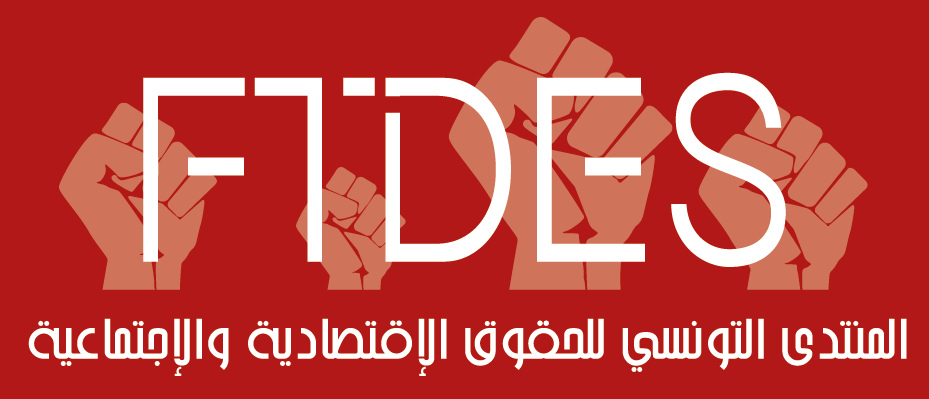POLICY PATHS FOR TACKLING MIGRATION IN TUNISIA WITH DIGNITY
By Simone Trucco (volunteer at the FTDES )
For the International Migrants Day which happens on the 18th of December, the Tunisian Forum for Economic and Social Rights (FTDES) reiterates the need for the Tunisian authorities, international non-governmental organisations, and the European Union to respect the human rights of migrants transiting through or residing in Tunisia, in accordance with the international, regional, and national treaties and laws they have signed.
Summary
Migration in Tunisia is a topic frequently mentioned in reference to Tunisians moving abroad. However, migrants live also in Tunisia, many of whom are from Sub-Saharan countries: as of 2020, almost 59,000 foreigners, including refugees and asylum seekers, were residing in Tunisia, a small number if compared with that of migrants living in Libya, Algeria, and Morocco.[1]
Even though the number of migrants is not that high, institutions persist in excluding them from national policies and their planning. The stakeholders, and mainly the Tunisian state, must guarantee their protection while they are on the Tunisian territory by including them in public policies, and ensure that they can legally leave the state in complete safety.
Violations of migrants’ rights
Violations of migrants’ rights in Tunisia are countless. Violence against them occurs also at an institutional level. Illegal refoulements, arbitrary violence and detentions have been reported on several occasions upon entering Tunisia, at the Carthage airport or at land and sea borders. Lately, the FTDES has recorded many instances of pushbacks at sea carried out by the Tunisian coast guard. The use of force to push boats back to the Tunisian coast endangers migrants’ lives.
Once within the country, migrants, and especially black-skinned individuals, often face racial profiling from law enforcement and racial discrimination. Moreover, outdated laws regulating the access of foreigners to the labour market obstacle their search for legally contracted jobs, even if there is a workforce shortage in some occupational sectors.[2] Due to these outdated and unwelcoming laws, migrants’ stay in Tunisia can easily become irregular, resulting in obstacles in legally accessing healthcare, social security, education, legal labour market, and often leading them to live in indecent accommodations. Their increased vulnerability exposes them to exploitation.
At the same time, they often lack the financial resources to pay the overstay fine and leave Tunisia, being deprived of their freedom of movement and leave the country with dignity. Moreover, like Tunisian citizens, migrants from third countries are often prevented from entering Europe legally. They are then confronted with the dangers of the sea route and the increasing interceptions of the Tunisian coast guard, an embodiment of the externalisation of the European migration policies.
Eventually, those who cannot complete their journey at sea and whose bodies are washed up on Tunisian coasts are humiliated even at the moment of their death. As recent news has shown, unidentified irregular migrants are buried without DNA recognition in common graveyards, thereby depriving their families from knowing the fate of their loved ones.
What should stakeholders do?
The FTDES urges the Tunisian government and authorities to:
- Improve the existing legal framework which protects migrant populations by
- Acceding to the 1975 Convention on migrant Workers and the 1990 Convention on the Protection of the Rights of All Migrant Workers and Members of Their Families.
- Amending the laws regulating the entry and stay of foreigners in Tunisia and their access to the labour market, namely the law n° 68-7 of 08/03/1968, the decree n° 68-198 of 22/06/1968, and the Tunisian Labour Code, from articles 258 to 269.
- Adopting an asylum law, as the last step in a comprehensive renewal of the legislative framework, which would abolish discriminatory laws against migrants.
- Respect, enforce, and implement the laws and conventions that Tunisia has already adopted at an international, regional, and constitutional level, including, but not limited to: the 1951 Convention relating to the Status of Refugees and its 1967 Protocol, the 1954 Convention relating to the Status of Stateless Persons and the 1961 Convention on the Reduction of Statelessness, the 1969 OAU Convention Governing the Specific Aspects of Refugee Problems in Africa, the 2003 Convention against Transnational Organised Crime; art. 24 of the 2014 Tunisian Constitution protecting from refoulement, the 2016 national law against trafficking in person, and the 2018 law combating any form of racial discrimination.
- Break free from the vassalage with the European Union and implement independent migration policies.
- Put an end to refoulement, pushbacks, and arbitrary detention episodes.
- Establish an institutional body to oversee every aspect that might concern migration issues, such as integrating labour and migration policies with a long-term perspective or getting in touch with the families of those missing at sea.
- Educate about racism, especially in public spaces and schools.
The FTDES equally calls to the international organisations and the United Nations Agencies to:
- Fulfil their mandate by protecting migrants and refugees in Tunisia and by using all legal means to advocate migrants’ rights to institutions.
Lastly, the FTDES rejects the European Union policies which ultimately result in making the irregular crossings at sea more dangerous. The FTDES appeals to the European Union to respect the sovereignty of Tunisia and to invest financial resources to promote safe and legal routes to Europe for migrants, regardless of their nationality, instead of pouring millions of euros into funding the Tunisian coast guard.
[1] As of 2021, around 597,000 migrants were estimated to be residing in Libya, and around 242,000 in Algeria. At the end of 2017, there was a total of 95,800 migrants in Morocco.
[2] The law n° 68-7 of 08/03/1968 relating to the condition of foreigners in Tunisia and the decree n° 68-198 of 22/06/1968 regulating the entry and stay of foreigners in Tunisia as modified by decree n°1992-716 of 20/04/1992.

 العربية
العربية English
English







